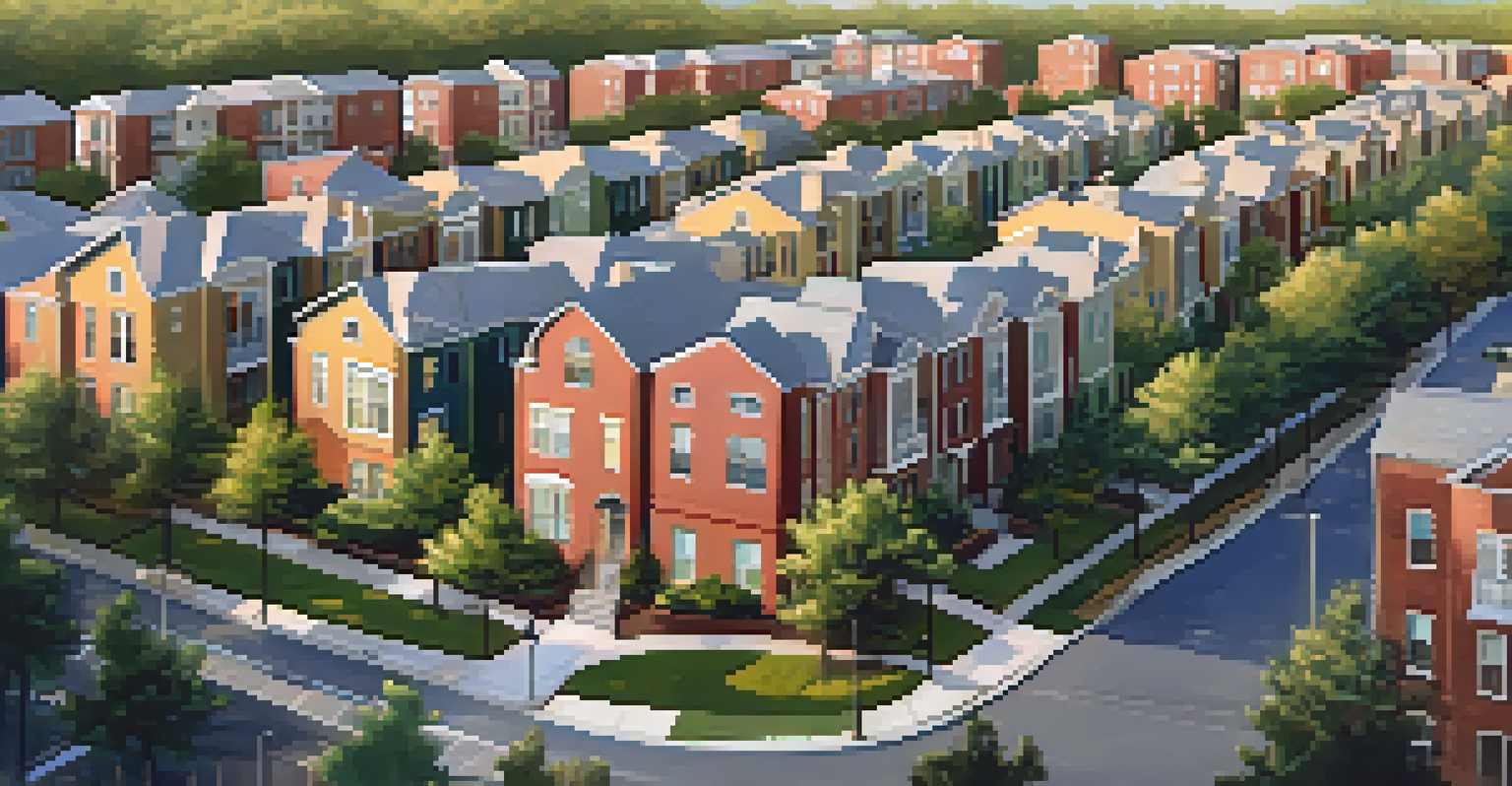Affordable Housing Initiatives in Atlanta's Urban Areas

Understanding the Affordable Housing Crisis in Atlanta
Atlanta is facing a significant affordable housing crisis, driven by rapid urbanization and rising living costs. Many residents struggle to find housing that fits their budget, especially in neighborhoods experiencing gentrification. This situation has sparked conversations about the need for sustainable and inclusive housing solutions.
Affordable housing is a critical issue that impacts the well-being of our communities and the economy as a whole.
The city's population growth has outpaced the availability of affordable units, leading to increased rent prices and displacement of lower-income families. According to recent studies, Atlanta has seen a 25% rise in housing costs over the last decade, making it increasingly difficult for many to secure stable housing.
Understanding this crisis is essential for comprehending the urgency of the initiatives being developed. Without intervention, the risk of homelessness and social fragmentation could escalate, impacting the community as a whole.
Key Players in Atlanta's Affordable Housing Initiatives
Several key stakeholders are driving the affordable housing initiatives in Atlanta. Local government, non-profit organizations, and private developers each play crucial roles in addressing housing needs. Collaborative efforts among these players help create a more comprehensive strategy to tackle the crisis.

For instance, the Atlanta Housing Authority (AHA) has been pivotal in managing public housing and implementing programs aimed at increasing affordable units. Their initiatives often focus on revitalizing neighborhoods while ensuring existing residents can remain in their homes.
Atlanta's Housing Crisis Explained
Rapid population growth and rising costs have created a significant affordable housing crisis in Atlanta.
Additionally, non-profit organizations like Habitat for Humanity and the Atlanta Neighborhood Development Partnership are actively working to build and preserve affordable housing. Their grassroots approach often involves community input and engagement, ensuring that developments meet the actual needs of residents.
Innovative Policies for Affordable Housing Development
Atlanta has implemented several innovative policies aimed at increasing affordable housing availability. One notable initiative is the inclusionary zoning policy, which requires developers to set aside a portion of their new projects for affordable units. This approach not only enhances housing access but also fosters mixed-income communities.
The best way to solve the housing crisis is to build more homes, but they have to be affordable and accessible to everyone.
Another significant policy is the use of tax incentives for developers who commit to creating affordable housing. By offering financial benefits, the city encourages private investment in low-income housing projects, which can lead to a more robust housing market.
These policies reflect a growing recognition that sustainable development must include affordable housing as a fundamental component. By aligning incentives with community needs, Atlanta is taking steps toward a more equitable urban landscape.
Community Engagement in Housing Solutions
Community engagement is a critical factor in the success of affordable housing initiatives. In Atlanta, local residents are encouraged to participate in discussions about housing development and neighborhood planning. This involvement ensures that the voices of those directly affected by housing issues are heard.
Workshops, town hall meetings, and surveys are common methods used to gather input from residents. This feedback helps shape policies and projects that truly reflect the community's needs and priorities, fostering a sense of ownership among the residents.
Key Stakeholders Collaborate
Local governments, non-profits, and private developers are working together to address the housing needs in Atlanta.
By prioritizing community engagement, Atlanta can create solutions that are not only effective but also culturally relevant and accepted by those who will live in them. This collaborative approach strengthens community bonds and enhances the overall impact of housing initiatives.
Success Stories in Atlanta's Affordable Housing Efforts
There are already several success stories emerging from Atlanta’s affordable housing initiatives. For example, the redevelopment of the historic Westside neighborhood has transformed the area while preserving its cultural essence. Thanks to a mix of public and private investment, residents can access affordable units amidst a revitalized community.
Another success is the partnership between the city and non-profits that resulted in the construction of hundreds of new affordable homes. These projects not only provide housing but also include amenities like parks and community centers, enhancing overall quality of life.
These success stories serve as beacons of hope and proof that with the right strategies and collaboration, significant progress can be made. They inspire further investment and involvement from various sectors, reinforcing the idea that affordable housing is achievable.
Challenges Facing Affordable Housing Initiatives
Despite the positive strides, Atlanta's affordable housing initiatives face several challenges. One of the most significant hurdles is the limited funding available for affordable housing projects. Competition for public funds can be fierce, leaving some initiatives under-resourced.
Additionally, opposition from local residents and NIMBYism (Not In My Backyard) can slow down or derail projects. Some community members express concerns about potential changes to neighborhood character or property values, leading to resistance against new developments.
Innovative Policies Drive Solutions
Policies like inclusionary zoning and tax incentives are being implemented to increase the availability of affordable housing in the city.
Addressing these challenges requires ongoing dialogue and education about the benefits of affordable housing. Building understanding and support within communities can help mitigate opposition and pave the way for more inclusive housing solutions.
The Future of Affordable Housing in Atlanta
Looking ahead, the future of affordable housing in Atlanta hinges on continued collaboration and innovation. As the city evolves, so too must its strategies for fostering affordable living options. Embracing new technologies and creative financing methods can help bridge the housing gap.
Moreover, the commitment to sustainability should remain at the forefront of housing initiatives. Developing energy-efficient, environmentally friendly housing can not only reduce costs for residents but also contribute to a healthier urban environment.

Ultimately, the goal is to ensure that Atlanta remains a city where everyone can thrive, regardless of income. By prioritizing affordable housing, Atlanta can cultivate a diverse and vibrant community that reflects its rich cultural heritage.